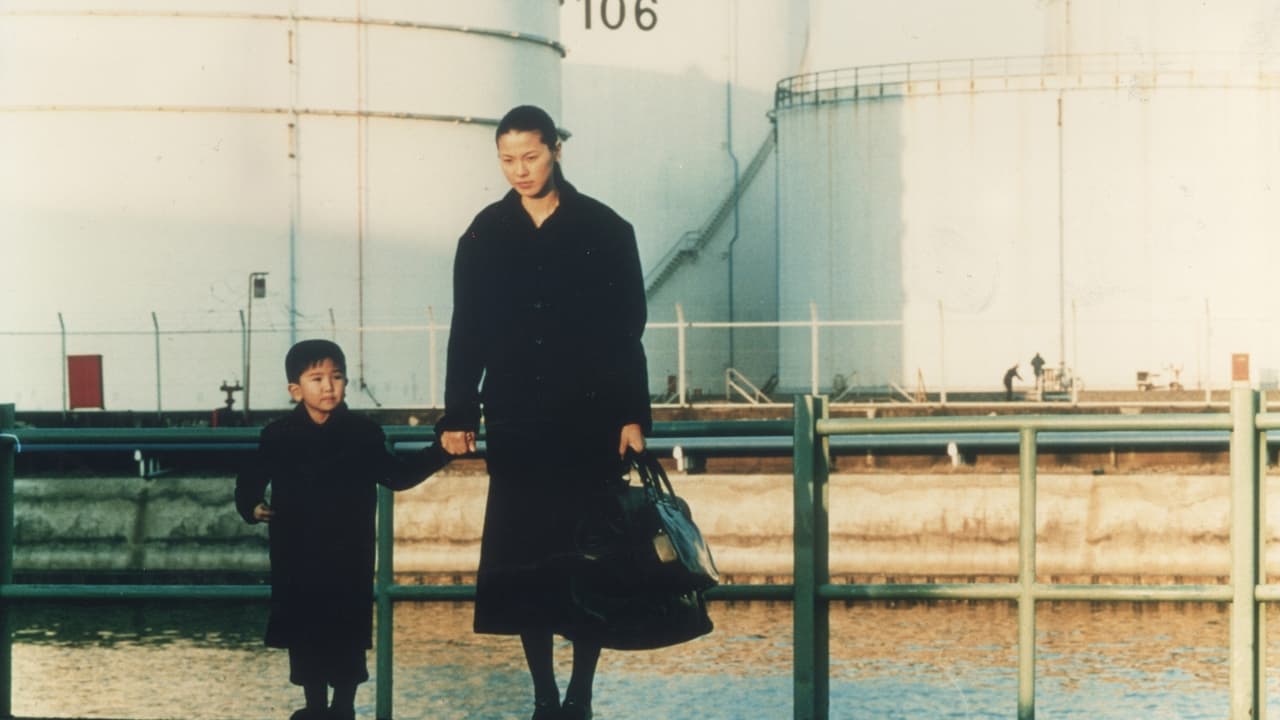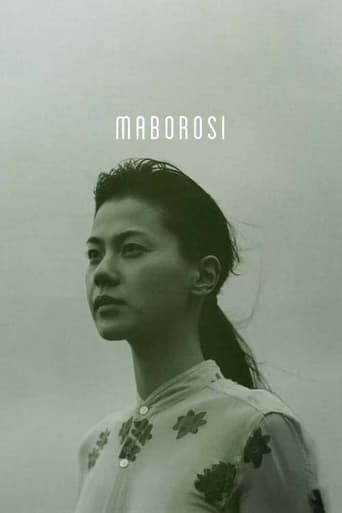Comwayon
A Disappointing Continuation
Livestonth
I am only giving this movie a 1 for the great cast, though I can't imagine what any of them were thinking. This movie was horrible
Kinley
This movie feels like it was made purely to piss off people who want good shows
politic1983
Asian cinema, good Asian cinema, can typically be hard to come by in the UK, with increasing difficulty, despite the increasing nature of media communications and online shopping and streaming. I like my Japanese cinema (well, not mine personally) and I find myself often frustrated with the lack of access to some of the better films on offer. But, locating a Korean, Region 3 DVD copy of Katsuhito Ishii's 'The Taste of Tea'; and sourcing a Japanese (thank God for Region 2!) copy of Kore-eda Hirokazu's 'Maborosi' - both featuring English subtitles - I set about watching two films considered towards the better end of Japanese cinema over the last two decades.One thing that interests me about both of these films is that their Japanese titles both feature the hiragana の('no'): 'Cha no aji' ('The Taste of Tea')and 'Maboroshi no hikari' ('Illusionary Light'). Both incorporating the Japanese possession particle, I thought that good enough a reason for comparison. The Japanese have noh theatre, so here's a bit of 'no' cinema...Both also star TadaNObu AsaNO. Starting with 'The Taste of Tea', as I watched that second, we see a film that can be described by unimaginative minds as 'quirky.' Looking at the lives of the HaruNO family, each has their own little story within the film and a mini-battle they want to overcome: the young daughter keeps seeing giant versions of herself; the son struggles with the fairer sex, hoping his go skills can woo; the uncle wonders aimlessly on his visit from Tokyo; the mother tries to re-ignite her animation career; the grandpa with his unusual habits. The most ordinary member of the family is the father, regularly away at work, but acting as the straight man to keep the extraordinary bunch together. And so is the situation in the lives of this Tochigi family, going about their strange ways each day in their sleepy town. But as the film develops, each family member unwittingly looks to another for support in overcoming their personal strife: the uncle helps the daughter with a 'crap' story from his childhood; the son practices go with his father; the grandpa poses for the mother's animation design; as well as helping out with the studio recording of the estranged brother's strange musical ambitions. 'The Taste of Tea' is a typical film about nothing, with no real plot to speak of, but more a series of scenes between the main characters. With a long running time, it could perhaps bore many, though the film has enough humour to keep entertained, with various sub-plots switching the attention so as not to make any one character become tired. But the real story here is one of family and how they all keep each other going, however unconventional the methods may appear. The bizarre grandpa proves to be the head of the family, watching over them all in his own idiosyncratic way. The characters are strange, the special effects are strange, yet it is somewhat of a familiar portrait of family life. Kore-eda Hirokazu is a director that is known for his films about stranger aspects of modern family life, with abandoned children, separated siblings and half siblings and switches at birth. However, whereas Ishii's is more a view of the strength of family ties, Hirokazu looks more at the strain the unusual scenarios can put on families in the modern world. One of his earlier films, 'Maborosi' looks at another unusual family scenario: Yumiko has a seemingly idyllic life in Osaka with her young husband - they are able to laugh and joke and look forward to the birth of their unborn child. However, unexplained and suddenly, Ikuo, her husband, commits suicide on local train tracks, leaving Yumiko's life in twilight. Re-marrying a steady widower, she moves to his small fishing hometown to live with his father and daughter. However, Yumiko's life lacks colour, seemingly in a daydream, struggling to come to terms with the loss of her first husband and the mystery around his death. 'Maborosi', therefore, is somewhat of a bleak film, creating a feeling of numbness. With the situation unresolved for Yumiko, Hirokazu chooses to shoot the entire film in twilight. The translation of the Japanese title, 'Imaginary Light', fits the film's tone perfectly. Similar to 'After Life', the colours of the screen are incredibly vivid and memorable, with a unique and haunting quality. In that sense, 'Maborosi' is a visual masterpiece of cinema, using colour perfectly to reflect the story. One of the best reviews I've read of 'Maborosi' described it as a if having 'read a haiku.' This is perhaps the best way to summarise this film: it paints a perfect picture of a woman's torment at her husband's death, yet maybe lacks any sense of journey; it paints the picture of an emotion, rather than telling a story. The film's revelation at the end comes as fast and as sudden as Ikuo's death, though maybe feels somewhat cheap and easy. This is a masterclass in the use of colour in a film, though perhaps the story and characters could be painted with a little more of that colour as well. 'The Taste of Tea' and 'Maborosi' are two films about unconventional families, though that is perhaps where the similarity ends. Both are slow films with little in the way of plot, but their outlook and style couldn't be more polemic. The joy of family life in 'The Taste of Tea's' is counteracted by the brooding mourning of 'Maborosi'. Colour is a word important to both: 'The Taste of Tea' brilliantly creates colourful characters and anecdotes to entertain; whereas 'Maborosi' uses colour to further the tone and mood of the film. While for different reasons, both are examples of brilliant film- making in their own right...It might just depend what mood you're in, no?!
poe426
One of the harsher lessons to be learned in this life is that not all the Love in the world can stay the hand of Death; it's the One, True GIVEN. MABOROSI makes this all too clear in a beautifully understated but ultimately very dramatic way; like Life itself, the movie plays out in a deliberate, measured manner, and it's almost as if we're voyeurs, eavesdropping on someone's most private moments. Our gaze (the filmmaker's) never wavers. Yumiko, though stunned by the unexpected turn of events, does what she has to to go on with her life- but we're well aware, every step of the way- every moment of the journey- that she's suffering... until the dramatic moment at the end of the film when she can remain silent no longer. MABOROSI is one of those truly UNIVERSAL films that remind us that we're ALL "alive and well on a friendless journey."
pontram
I first liked the silence in this movie, but later I decided that it tells us about speechlessness, especially connected with the occurrence of sudden death. As an European, or simply feeling with Yumiko, I often said to her by myself "lets go and cry the hell out", but she didn't or it wasn't shown and I interpret this as Japanese behavior. She seems to be very smart and holds her feelings back. She adapts to the situation and won't allow any grief to take her over. But sometimes - I personally think - you should let you been overpowered by grief and sadness, so that the inner pressure can find a valve. Otherwise you could be damaged. When Yumiko visits her mother after a time, she looks like she came over. But she didn't. The barkeeper in the little coffee/tea shop tells her that he had seen her husband just before the incident, and he says that he looked and behaved as usual. This brings back the whole thing to Yumiko, and I felt a big power in this scene. I feared she would go back to their common apartment unprepared, and so she does, and so she is punished by the unmanaged remnants of her lost past.I liked the look of the movie, but I could not adore some painting-like stills or wonderful shots. Therefore I have seen too many movies in such a style, especially from Japan or Korea. And I don't give much about the style when I see such a movie, because a deeper going movie doesn't need style to reach me. I liked that the pictures weren't so beautiful, as in other Japanese productions. More or less, I had a good impression to see real places and follow real people in real life. Real life is often dull, gray or sad, especially when you lose your beloved partner. The reason is not that important, because what lasts is the partner's absence.Thus the causing of Yumikos first husbands' suicide is not important, and it is clear from the beginning that she never will find out. It is a constructed event that should lead us away from every disturbing explanation. The try to explain it on the end with some mystical light is a crutch, formed from helplessness. Instead, her new husband - how he lost his former wife stays in the dark - should have had a serious talk with her, about hers and his feelings, about life and death, about their inner movings. Isn't it strange that she only wants to speak with him when he is very drunken and not able to answer ? I identify the lack of discussion, the lack of review (which is fascinating for many viewers of the movie) as the real sadness, and the movie wants to tell about what happens if everybody keeps calm as required in Japan - nothing spectacular, but probably nothing enjoyable.We are helpless against fate - more modern: statistics - and helpless against the fragile illusion of a stable life and continuity, but not with our inner worlds. Being together means also sharing thoughts, not only relatives or day-work.
Paul Martin
Not having seen a Kore-eda film before, the style of this film took a while to get a handle on. It is a film about grieving, about loss. A young woman with a newly born child loses her husband, who has apparently committed suicide. There is little dialogue and little development of relationship dynamics with much of the gaps to be filled in by the imagination of the audience. The film had the style of a 1970's art film; there was a sense of timelessness about it.Kore-eda has an aesthetic that won't appeal to the casual film-goer. It is very slow-moving, and some of the indoor shots are quite dark. After a while, I got the sense that the viewer's attention is not meant to take in the whole screen, but rather parts of the screen such as the illuminated side of a woman's face in a dark room or the shapes of people reflected in water. Kore-eda seems fascinated with light and exploration of its use. Frames of illuminated subjects are contained within the larger screen frame. Light reflects of different surfaces, and at different times of the day. This is a film where you really need to 'get in the zone'.I liked the film. It rewards the patient viewer and the ending was very moving. A repeat viewing will enhance my appreciation and I look forward to seeing more of Kore-eda's films as part of a retrospectve at the Melbourne International Film Festival.

